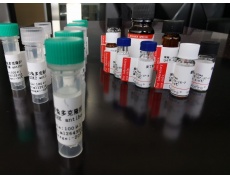中文名稱: HSD17B13抗原(重組蛋白)
英文名稱: HSD17B13 Antigen (Recombinant Protein)
別 名: SCDR9; NIIL497; SDR16C3; HMFN0376
儲 存: 冷凍(-20℃)
相關類別: 抗原
概 述:
|
Fusion protein corresponding to a region derived from 20-300 amino acids of human HSD17B13 |
|
Full name: |
hydroxysteroid 17-beta dehydrogenase 13 |
|
Synonyms: |
SCDR9; NIIL497; SDR16C3; HMFN0376 |
|
Swissprot: |
Q7Z5P4 |
|
Gene Accession: |
BC112303 |
|
Purity: |
>85%, as determined by Coomassie blue stained SDS-PAGE |
|
Expression system: |
Escherichia coli |
|
Tags: |
His tag C-Terminus, GST tag N-Terminus |
|
Background: |
Hydroxysteroid (17-beta) dehydrogenase 13, also designated Short-chain dehydrogenase/reductase 9 (SCDR9), which regulate the availability of steroids within various tissues throughout the body. HSD17B13 is a 300 amino acid secreted protein that is highly expressed in liver and is also detected in ovary, bone marrow, kidney, brain, lung, skeletal muscle, bladder and testis. The gene encoding HSD17B13 maps to chromosome 4, which houses nearly 6% of the human genome and has the largest gene deserts (regions of the genome with no protein encoding genes) of all of the human chromosomes. Defects in some of the genes located on chromosome 4 are associated with Huntington's disease, Ellis-van Creveld syndrome, methylmalonic acidemia and polycystic kidney disease. |
 購物車
購物車 幫助
幫助
 021-54845833/15800441009
021-54845833/15800441009
